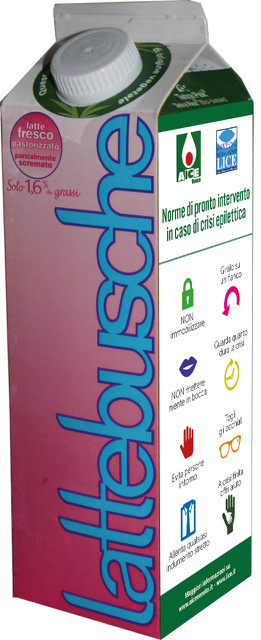The Italian League Against Epilepsy (LICE) and Italian Association Against Epilepsy – Veneto (AICE) have launched an initiative that aims to increase public understanding of epilepsy, with the hope that it will be replicated in other countries.

What is more common than a carton of milk?
With half a million people living with it, and 30,000 new cases found per year in Italy, epilepsy is a very common pathology. Yet it is seen as an obscure disease which should be hidden. This add to the stigma around it, which is hard to eradicate. This is not true for the Lattebusche dairy co-op, which from December 2018 to May 2019 will sell cartons of milk at all points of sale, displaying the 8 rules to follow in case of a seizure.
The awareness campaign will reach out at least 1,5 million people. In addition, for International Epilepsy Day (February 11th), 300,000 Lattebusche cartons of milk will display the same rules on one side of the carton. The co-op will also print the rules in 100,000 flyers to be distributed until May.
“Epilepsy is a disease with a lot of fear and skepticism around it”, states Sergio Giordani, major of Padua. “a completely unjustified behavior, which negatively impacts people who suffer from this pathology. This awareness campaign, it’s first and foremost a sign of civilization to cancel the social stigma around the disease and give a rightful knowledge to it; it is also, a very important tool of information for those who find themselves next to someone during a seizure. I thank you Lice, and Aice for this initiative and particularly Lattebusche for their social sensibility demonstrated by significantly collaborating in this campaign”.
The Eight Rules
So how do you deal with epileptic seizure? You just need to remember eight simple applicable rules.
First of all, the person who is having a seizure should not be immobilized, but turned on the side. Then, eyeglasses and other constricting clothes need to be removed. Do not put anything inside their mouth to avoid complications to the patient (and yourself in case of rigid locking). It is essential to avoid confusion: so it’s better if there aren’t people around. Finally, only at the end of a crisis, it is appropriate to offer help.
For further information contact:
Enrico Albertini – [email protected]



